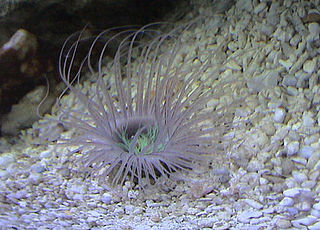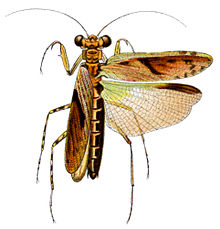Genus is a taxonomic rank used in the biological classification of living and fossil organisms as well as viruses, in biology. In the hierarchy of biological classification, genus comes above species and below family. In binomial nomenclature, the genus name forms the first part of the binomial species name for each species within the genus.

In taxonomy, binomial nomenclature, also called binominal nomenclature or binary nomenclature, is a formal system of naming species of living things by giving each a name composed of two parts, both of which use Latin grammatical forms, although they can be based on words from other languages. Such a name is called a binomial name, a binomen, binominal name or a scientific name; more informally it is also called a Latin name.

The thrushes are a passerine bird family, Turdidae, with a worldwide distribution. The family was once much larger before biologists determined that the subfamily Saxicolinae, which includes the chats and European robins, are Old World flycatchers. Thrushes are small to medium-sized ground living birds that feed on insects, other invertebrates and fruit. Some unrelated species around the world have been named after thrushes due to their similarity to birds in this family.

Amorphoscelidae is a family of mantises in the order Mantodea.

Tube-dwelling anemones or ceriantharians look very similar to sea anemones but belong to an entirely different subclass of anthozoans. They are solitary, living buried in soft sediments. Tube anemones live inside and can withdraw into tubes, which are composed of a fibrous material made from secreted mucus and threads of nematocyst-like organelles known as ptychocysts. Within the tubes of these ceriantharians, more than one polyp is present, which is an exceptional trait because species that create tube systems usually contain only one polyp per tube. Ceriantharians were formerly classified in the taxon Ceriantipatharia along with the black corals but have since been moved to their own subclass, Ceriantharia.
Amorphoscelis tigrina is a species of praying mantis found in Benin, Burkina Faso, Guinea, Cameroon, Nigeria, and Senegal.
Amorphoscelis ceylonica is a species of praying mantis found in Sri Lanka. The species is now recognized as a synonym of Amorphoscelis pellucida.
Amorphoscelis nubeculosa is a species of praying mantis found in Cameroon.
Amorphoscelis chopardi is a species of praying mantis found in Côte d'Ivoire and Ghana.
Amorphoscelis griffini is a species of praying mantis found in Côte d'Ivoire and Cameroon.
Amorphoscelis pellucida is a species of praying mantis native to Australia, Java, and Singapore. The South Asian species Amorphoscelis ceylonica from India and Sri Lanka, once thought to be a separate species is now classified as a synonym of Amorphoscelis pellucida.

Amorphoscelis tuberculata is a species of praying mantis native to Namibia, Mozambique, Transvaal, Zimbabwe.
Amorphoscelis opaca is a species of praying mantis found in Cameroon.
Amorphoscelis annulicornis is a species of praying mantis found in Sri Lanka, India, Nepal, and Malaysia.
Amorphoscelis austrogermanica is a species of praying mantis found in Namibia, KwaZulu-Natal, Transvaal, and East Africa.
Amorphoscelis lamottei is a species of praying mantis found in Ivory Coast, Ghana, Guinea, and in the Congo River area.
Amorphoscelis naumanni is a species of praying mantis native to Afghanistan.
Amorphoscelis punctata is a species of praying mantis native to Ivory Coast, Ghana, Cameroon, Congo basin, and Sierra Leone.






